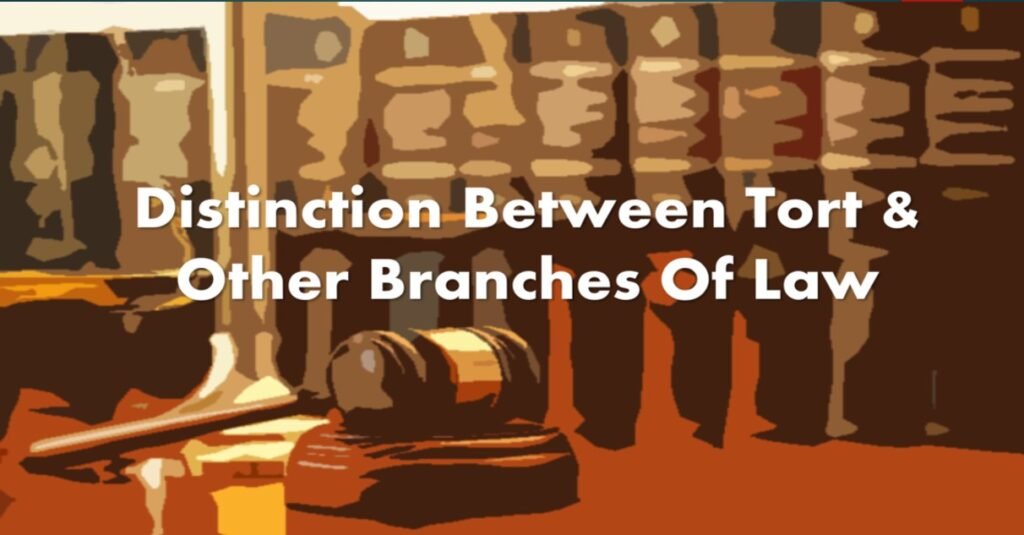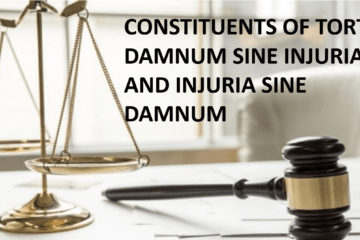
This Article is written by Vamakshi Pareek, 2nd Year, BA.LL.B., RNB Global University, Bikaner.
Tortious Liability and Mental Element
Tort is civil in nature and arises when a person causes injury to another person’s reputation, life, etc., here the intention with which the injury is caused is may or may not be fundamental. In law of torts, it is not necessary to note whether it was intentionally or accidentally, the liability arises either way.
However, it is significant to know that mental element dose not plays a great role in determining the tortious liability, because there are certain torts that can be committed without having any intention, like Tort of Negligence.
On the basis of Intention there are two types of torts:
- Intentional Tort: An intentional tort requires the claimant to show that the defendant caused the injury on purpose and that he/she has suffered certain injury because of the defendant’s action. The concept of Mala Fide intention is necessary to commit an intentional tort. It includes:
- Battery
- Assault
- False Imprisonment
- Trespass to land and chattels.
- Unintentional Tort: The best example can be of Negligence. These are caused mistakenly or accidentally, without any mala fide intention. Here the claimant needs to establish three elements:
Duty of Care
Breach of Duty of Care
Harm to the Claimant.
The theories related to intention can be either Objective or Subjective. The first states that, the liability of tort arises irrespective of mental state of the defendant. In case of Wilkinson Vs. Downtown, although the defendant just made a joke about plaintiff’s husband’s health, due to which she got nervous shock, but the court held the defendant liable under tort, even though she did not have any intention to do so.
In contradiction to the first, the second theory states that the mental state of the wrongdoer is essential in determining the appropriateness of the liability. It requires to punish the wrongdoer for having the intention or knowledge while committing the wrong.
Distinction between Law of Tort and Law of Crime
| Law of Tort | Law of Crime |
| A tort is a private wrong, an infringement of a private right of a person. | A Crime is a public wrong, is against the whole world or public at large. |
| The remedy is Unliquidated damages. | The remedy is liquidated damages. |
| In case of a tort, the suit is filed by the victim, himself. | In case of a crime, the complaint is filed by the state. |
| Law of Tort is an uncodified law. | Law of Crime is a codified law. |
| The mental element is significant but not in all cases. | The mental element is the crux in all the cases. |
| It is a right in Rem. | It is a right in persona. |
| The person who commits the tort is a tortfeasor. | The person who commits a crime is the offender. |
| Tort is a compoundable offence. | Crime is not a compoundable offence, except in certain cases. |
Distinction between Law of Tort and Law of Contract
| Law of Tort | Law of Contract |
| The duty is fixed by the court of law. | The duty is fixed by the parties to the contract. |
| Motive is taken into account. | Motive is usually irrelevant. |
| The duty is towards the whole society. | The duty is towards specific individuals only. |
| Damages are unliquidated. | Damages are liquidated. |
| Provides unlimited remedy. | Provides limited remedy. |
| Consent is immaterial. | Consent is essential. |
Distinction between Law of Tort and Breach of Trust
| Law of Tort | Breach of Trust |
| The damages are unliquidated. | The damages are liquidated. |
| It is a part of common law. | It could be redressed in the Court of Chancery. |
| It is not the division of law of property. | It is the division of law of property. |
Distinction between Law of Tort and Quasi-Contract
| Law of Tort | Quasi-Contract |
| Damages are unliquidated. | Damages are liquidated. |
| It is a duty fixed by court of law. | It is an obligation imposed by the court of law. |
| The duty is towards the whole society. | The obligation is towards a particular person. |
Distinction between Law of Contract and Law of Crime
| Law of Contract | Law of Crime |
| It is a right in Rem | It is a right in Persona. |
| The duty is towards only a particular individual. | The duty is toward the whole society. |
| Consent is material. | Consent is not material. |
| The objective is to protect the right of the parties to a contract. | The objective eis to ensure peace and harmony in the society. |
| It comes under the ambit of Civil Law. | It comes under the ambit of Criminal Law. |
| Mens Rea is relevant. | Mens Rea is irrelevant. |
Distinction between Law of Contract and Quasi-Contract
| Law of Contract | Quasi-Contract |
| There is an agreement between the parties. | There is not a specific agreement as it is just a constructive contract. |
| Consent is material. | Consent is immaterial. |
| It is right in Rem. | It is right in Persona. |
| Liabilities exist as per the terms of the contract between the parties. | Liability exist irrespective of the terms and is based on equity, justice and good conscience. |




0 Comments